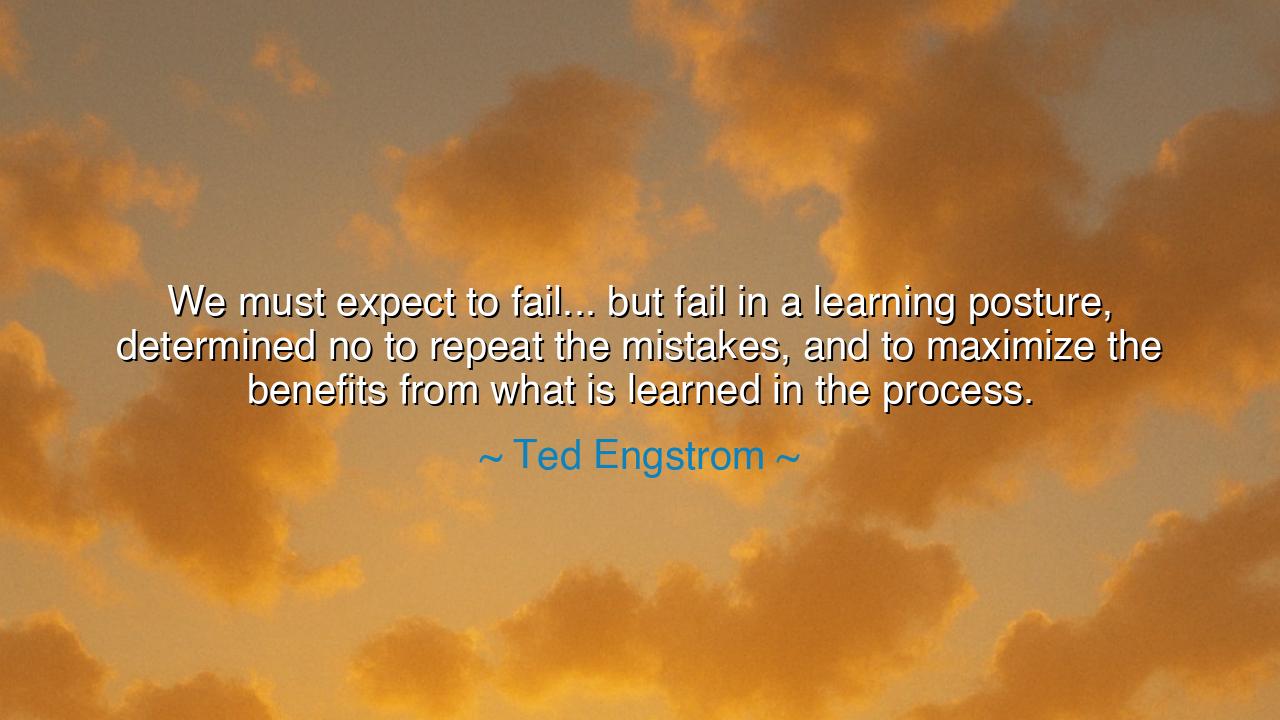
We must expect to fail... but fail in a learning posture
We must expect to fail... but fail in a learning posture, determined no to repeat the mistakes, and to maximize the benefits from what is learned in the process.






“We must expect to fail… but fail in a learning posture, determined not to repeat the mistakes, and to maximize the benefits from what is learned in the process.” — Ted Engstrom
In this noble reflection, Ted Engstrom, the visionary leader and author known for his writings on faith, leadership, and human development, offers one of the most enduring truths of growth: that failure is not the enemy of success, but its most faithful teacher. His words pierce the pride of those who fear to stumble and awaken the humility of those who seek to rise. To expect to fail is not to surrender to defeat — it is to acknowledge the divine rhythm of learning, the truth that progress is carved through imperfection, and that wisdom is born of wounds. Engstrom calls us not to despair in our falls, but to fall with dignity — in a learning posture, ready to transform our pain into understanding.
The ancients understood this principle well. The philosophers of Greece, the warriors of Rome, and the sages of the East all taught that the path to mastery is paved with errors, each misstep a lesson disguised as hardship. Aristotle declared that “we learn by doing,” and to do is to err, to refine through repetition what was once crude. Engstrom continues this lineage of wisdom, reminding us that to live is to experiment, and to experiment is to fail — but only the wise transform their failures into foundations for greater heights. The fool denies the lesson; the wise kneel before it.
In his own work as a leader and thinker, Engstrom guided organizations through uncertainty and challenge. He saw firsthand that those who succeeded were not the ones who never failed, but the ones who failed well — who examined their shortcomings, sought understanding, and rose again with clarity and conviction. His phrase, “learning posture,” evokes the image of the humble student — not bowed in shame, but in reverence before the teacher that is experience. To fail in such a posture is not to fall backward, but forward — into growth, into self-awareness, into resilience.
Consider the story of Thomas Edison, whose tireless experiments led to the invention of the light bulb. When asked about his thousands of failed attempts, he famously replied, “I have not failed. I’ve just found ten thousand ways that won’t work.” Edison exemplified the spirit of Engstrom’s wisdom — a man who expected failure, but approached each one as a lesson. He did not bow in defeat; he learned, adapted, and built success upon the ashes of error. His greatness did not lie in his genius alone, but in his learning posture, his unbreakable commitment to transform failure into illumination.
There is a kind of heroism in this way of living. To embrace failure without bitterness is to rise above fear itself. The world often praises victory, but the wise know that failure is the forge of the soul. The person who falls, reflects, and grows becomes unshakable, for they have faced the fire and learned its language. Each failure, rightly understood, burns away arrogance and strengthens resolve. Engstrom’s counsel is thus both practical and spiritual: to maximize the benefits of what is learned is to turn pain into progress, to transform loss into wisdom, and to make every fall a step higher on the ladder of becoming.
But to do this requires discipline — the discipline to pause, to reflect, and to refuse the easy refuge of blame or despair. When we fail, the natural impulse is to turn away, to hide from the sting of shame. Yet Engstrom teaches the opposite: to turn toward it, to study the wound until we understand its cause, and to walk forward with renewed purpose. This is what it means to fail “in a learning posture” — to meet adversity not with resentment, but with curiosity. Every mistake becomes a mirror, showing us not who we were, but who we might yet become.
So, dear listener, let these words be carved into your heart: expect to fail, but never fail to learn. Do not fear your stumbles; fear only standing still. When you fall, rise with reflection. When you err, examine the lesson hidden within. Keep your mind supple, your spirit humble, and your will unbroken. For the one who learns from failure cannot truly be defeated — they are reborn, each time stronger and wiser than before. As Engstrom reminds us, success is not the absence of failure; it is the mastery of it. To fail with purpose is not to fall — it is to ascend, one hard-won lesson at a time, toward the summit of understanding and the glory of growth.






AAdministratorAdministrator
Welcome, honored guests. Please leave a comment, we will respond soon